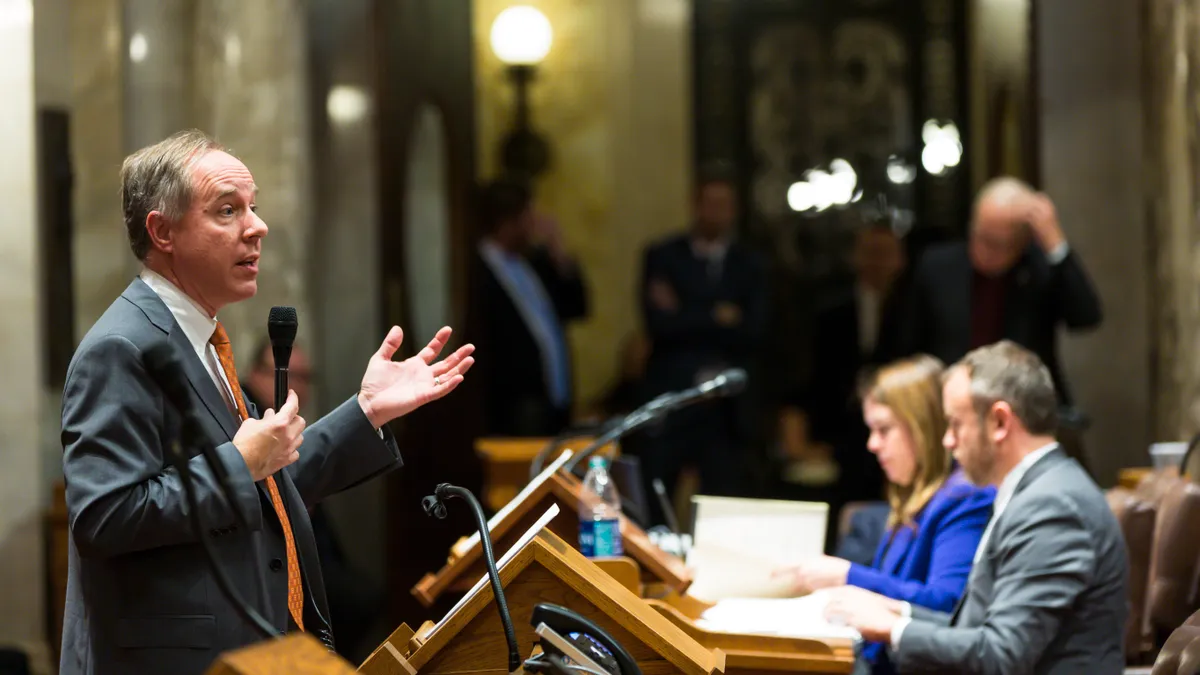Dive Brief:
- Two prominent Republican politicians in Wisconsin are condemning a mandatory University of Wisconsin-Madison course for graduate students that cites critical race theory.
- Graduate students must take the two-hour webinar, which concentrates on gender and relationship violence, to enroll in classes. It contains only a brief reference to critical race theory and its influence on feminism, according to a university spokesperson.
- But it has still attracted the ire of Wisconsin's GOP Assembly speaker, as well as a candidate for governor. Republicans nationwide have publicly denounced critical race theory, a four-decades-old academic concept, in order to galvanize their base.
Dive Insight:
The course caught public attention after the state's former lieutenant governor, Rebecca Kleefisch, now a gubernatorial candidate, posted a video to her Facebook page last month.
Kleefisch, a UW-Madison alum, said the university was funneling taxpayer dollars into a training that shamed individuals for their identity, pointing out that part of the unit quizzed them on topics such as privilege.
"We shouldn't be teaching people to feel bad about things they can't change. We shouldn't be teaching students to judge people primarily by what they look like," she said in the video. "And we shouldn't be teaching critical race theory, nor making it a condition of enrollment at a taxpayer-funded university."
Critical race theory is an academic construct saying in part that racism is systemically baked into societal structures. It gained notoriety after former President Donald Trump railed against the framework, issuing an executive order last year forbidding federal grantees from teaching certain "divisive" concepts. The Biden administration rescinded the order.
On Tuesday, nearly a month after Kleefisch released her video, Robin Vos, speaker of the Wisconsin State Assembly, wrote to UW-Madison Chancellor Rebecca Blank, demanding to know why the course is mandatory.
Vos said it's unacceptable UW-Madison is forcing a course on students "that instills the university’s negative opinion of white students and the idea that students should feel guilty simply because of their race."
He accused officials of foisting their political beliefs and agenda on students under the guise of violence prevention education.
The webinar was developed in response to a 2016 American Association of Universities survey indicating graduate students were not well-informed about campus policies and resources for sexual misconduct, UW-Madison spokesperson John Lucas said in an email.
Lucas said the university will continue to review the course "and make any appropriate changes for Spring 2022."
"Offering a webinar like this is an important part of the university's sexual violence prevention efforts," Lucas said.
Other conservative policymakers across the U.S. have sought to block and in some cases successfully banned critical race theory from K-12 schools and college classrooms. They have questioned critical race theory in other ways, too.
In North Carolina, for instance, a collection of state representatives wrote to the chancellor of the University of North Carolina at Chapel Hill this month, expressing disappointment that the institution's Office of Fraternity and Sorority Life held a mandatory diversity training.
They deemed the contents of the training, which reportedly included that White privilege pervades society, "divisive and offensive."
The lawmakers asked the chancellor the cost of the program, whether it would be mandated in the future, and if the university had a strategy for tackling "concerns related to politically-motivated indoctrination on campus both in the classroom and in university-sanctioned organizations."










